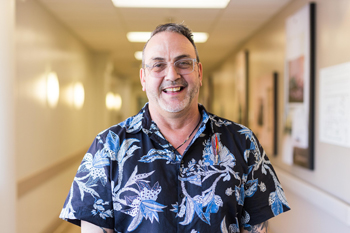Q&A with Leonard Benoit, Aboriginal navigator

By Amber Daugherty

Leonard Benoit
Leonard Benoit is a nurse and understands how to navigate the health-care system. But for other First Nations, Inuit and Métis peoples, concern about stigma, discrimination and other factors can prevent them from coming into the hospital – even at the expense of their own health. Indigenous People disproportionately show rising rates of cancer and are diagnosed at a stage when it’s too late to talk about a cure.
To support these patients, Leonard became an Aboriginal navigator with the Toronto Central Regional Cancer Program, a position that supports patients at hospitals across Toronto – including St. Joseph’s and St. Michael’s – as they navigate the health-care system. We caught up with him to learn more about his role and how he’s helping enhance patient experience.
Why is a role like this necessary?
A lot of people don’t know Indigenous culture or language, which can create barriers in providing appropriate care. First Nations, Inuit and Métis peoples have different spiritual needs, including smudging, which some hospitals have policies for and others are still working on. It’s important that we educate health-care professionals about different cultural needs so that when anyone walks into a space they feel welcome and safe.
Indigenous Peoples also have a complicated relationship with institutions because of perceived stigma and discrimination, so I work with them to learn what their needs are and what I can help them with. If we can help Indigenous patients feel more comfortable navigating the health system, I think we would see them access care faster and serious issues caught earlier through screening.
How do you provide support in this role?
A cancer diagnosis can prompt a lot of fear – I can help by going to appointments, asking questions and explaining anything the patient doesn’t understand. I’m also a resource for staff – I bring the perspective of the patient to the care team to help them understand issues that may be at play including historical trauma, PTSD, perception of stigma and so on. Having these conversations makes it easier for patients to access care and hopefully have a better outcome. Reaching out to me is another layer of wraparound support.
Why is it important to you to support the Indigenous community in this way?
This role was created to get people screened and into treatment sooner so that they have better outcomes and I’m happy to contribute to that goal. I am First Nations and this allows me to do amazing things with my brothers and sisters, to dabble in a little bit of nursing and to help connect people to the care they need – both in hospital and in the community.
Leonard is one of ten Aboriginal navigators across the province with CCO. He has an office at St. Michael’s Hospital and can be reached anytime via email: benoitl@smh.ca.
About St. Michael’s Hospital
St. Michael’s Hospital provides compassionate care to all who enter its doors. The hospital also provides outstanding medical education to future health care professionals in more than 29 academic disciplines. Critical care and trauma, heart disease, neurosurgery, diabetes, cancer care, care of the homeless and global health are among the Hospital’s recognized areas of expertise. Through the Keenan Research Centre and the Li Ka Shing International Healthcare Education Centre, which make up the Li Ka Shing Knowledge Institute, research and education at St. Michael’s Hospital are recognized and make an impact around the world. Founded in 1892, the hospital is fully affiliated with the University of Toronto.
